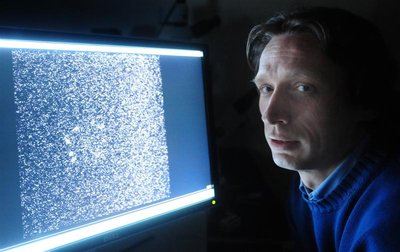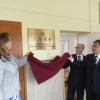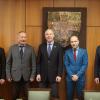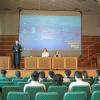In memoriam - Prof. Dr. István Miklós Ábrahám (1967-2021)
2021
Jun
21
It is with deep sadness we bid farewell to Professor Dr. István Ábrahám, Director of the Institute of Physiology, the University of Pécs Medical School, and our beloved colleague.

István Ábrahám was born in 1967 in Budapest.
Notably, Professor Ábrahám graduated summa cum laude from the University of Pécs, Medical School, in 1993.
As a student, he began research at the Institute of Physiology, Neurophysiology Research Group of the Hungarian Academy of Sciences, under the guidance of Professor László Lénárd. During his undergraduate years, Professor Ábrahám achieved outstanding results in which he was awarded the Fellowship of the Republic in three separate instances. Additionally, he was awarded a Demonstrator Fellowship, and in 1993, he was awarded the Pro Scientia Gold Medal.
Uniquely, in 1993, he presented two lectures at the National Conference of the Undergraduate Research Society, in which he was first author. One lecture referenced HPLC measurements of brain neurotransmitters for which he was awarded Second Prize, while the other one was inspired by the emerging chaos theories of the time, regarding the analysis of the Lyapunov exponent and correlation dimension of EEG signals, for which he was awarded First Prize.
Following graduation, he continued his PhD studies at the Institute of Experimental Medicine in Budapest, under the supervision of Dr. Krisztina Kovács. During this time, he broadened his professional knowledge in the research group of world-renowned neuro-endocrinologist Béla Bohus, at the University of Groningen in the Netherlands. He defended his thesis summa cum laude at the Doctoral School of Semmelweis University of Medicine in 1998.
After earning his PhD, he spent two more years at the Molecular Neuroendocrinology Research Group of the Institute of Experimental Medicine, where his research focused on stress-related neuronal networks.
Between 2000 and 2002, he was a Marie Curie Fellow at the Babraham Institute in Cambridge, England, where he developed a lifelong professional relationship with Professors Allan Herbison and Seong Kyu Han. His interest then shifted towards studying the non-genomic effects of estrogen in the brain.
Following his return home, he became one of the leading researchers in the Neurobiology Research Group of the MTA-ELTE for a period lasting four years, in which he continued studying the effects of estrogen in the brain. During this time, two PhD students obtained their doctoral degrees under his professional supervision.
In 2007, he was offered the opportunity to set up and manage his own research group at the University of Otago in New Zealand, where he achieved considerable professional success. During the six years he spent in New Zealand, two other students completed their PhDs under his guidance. While in Otago, he developed a close collaboration with Professor Akahiro Kusumi, a renowned Japanese scientist in the field of single molecule detection. It was this collaboration which gradually shifted his interest towards super-resolution microscopy.
Despite his success abroad, his heart always remained in his native land, in Hungary, where he envisioned a future for his children and his family. Eventually, he returned to his Alma Mater in 2011.
With the support of, among others, including the Albert Szent-Györgyi Scholarship, Professor Ábrahám began implementing his innovative ideas in 2013. Following his appointment as Professor, he founded the Molecular Neuroendocrinology Research Group, which has consistently undergone expansion, and in the following years, evolved into a professionally diverse and exceptionally cohesive group.
He was instrumental in founding and chairing the first Center for Neuroscience in the country, at the University of Pécs.
Following his appointment as Director of the Institute of Physiology in 2019, he immersed himself into this task with his characteristic drive and determination. His guiding principle regarding the organizational restructuring was to support and unite the ambitions of all staff to the benefit of the Institute, creating the ultimate environment for the continuous improvement of the quality of research and teaching.
Additionally, Professor Ábrahám exerted immense energy in seeing one of his greatest dreams take flight, which was the creation of a microscopy center, unique throughout Europe, which was completed in 2021 and will soon launch international research.
Professor Ábrahám served on several editorial boards of international scientific journals and scientific societies. In early 2021, he was elected President of the internationally renowned Hungarian Neuroscience Society, which includes hundreds of eminent researchers.
Professor Ábrahám saw his work in the form of community service, which he did with the utmost in dedication and devotion. His seemingly infinite energy, drive, perseverance and zest for life were an inspiration to those who worked with him.
His inner character consistently accepted colossal responsibilities and he routinely demonstrated to his fellow colleagues vast reserves of intuition, resolve and verve, fueled by spontaneity.
Admirably, he was a friend to everyone.
Dear István,
It is with immense sorrow we bid you farewell. You left us suddenly, leaving a deep void within our souls. Through the legacy of your work, your memory lives on among us and in the entire neuroscience research community. The strategic plans you set for yourself and implemented have now irrevocably defined the future and success of a new Institute of Physiology of the 21st century.
Your spirit will live on throughout the scientific research projects you initiated, as seen through the microscopes, depicted in the grand plans, throughout the hearts, memories, actions and future decisions of colleagues and friends.
We thank you for daring to dream big and for fulfilling many of them during your all too brief, yet decisive, time in Pécs.
Without you, it will be difficult to continue, however, we can only remain true to your memory if we pursue the future you dreamed, despite the challenges which lay ahead.
Rest in peace.
The staff of the Institute of Physiology, UPMS, May 2021.
- Log in to post comments
University of Pécs | Chancellery | IT Directorate | Portal group - 2020.
















